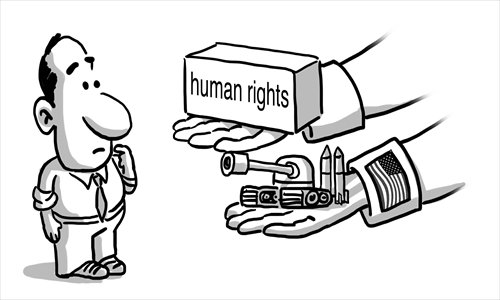Kerry looks to strike bargain with Hanoi over human rights

Illustration: Liu Rui/GT
US Secretary of State John Kerry spoke highly of the transformation of the US-Vietnam relationship from foes to friends on his recent visit to Hanoi. On the 20th anniversary of the normalization of the relationship with Vietnam, Kerry lauded the progress in security cooperation, trade and educational exchanges. Meanwhile, he warned that "Hanoi's poor human rights record stood in the way of deeper bonds" between Washington and Hanoi, which fought a bitter decades-long war that ended in 1975.
During the visit, the request raised by Vietnam's Foreign Minister Pham Binh Minh to the US to fully lift the embargo on weapons sales were rejected, with US officials insisting that "the embargo would not be eased further without concrete progress made on human rights issues. "
The US has never given up its efforts to transform Vietnam from socialism to capitalism. Vietnam is a socialist country with the Communist Party as the ruling party. This is in fundamental conflict with Washington. The US is inclined to make friends with countries that share a commitment to certain values. This value-oriented diplomacy promoted by recent administrations requires that Vietnam make changes over the human rights issues in exchange for deeper ties with the US.
In addition, the US government is also under huge pressure from millions of Vietnamese Americans. Some Vietnamese Americans anticipate getting rid of Vietnam's intolerance of domestic dissent and are pressuring the Obama administration to exert influence on Hanoi to make a change.
Although Vietnam and the US have conflicts on certain values, one of the main purposes of Kerry's visit is to form an alliance with Hanoi, an attempt to counter China in the Asia-Pacific region.
Last year, Washington partially dropped a 40-year ban on weapons sales to Hanoi, in an attempt to advance US-Vietnam ties.
Both are keenly guarding against China's rapid growth. The territorial dispute between Vietnam and China over the island chains in the South China Sea has been simmering for long.
The US, meanwhile, attempts to counter China by taking advantage of Vietnam.
Washington expects Hanoi to be the representative for its pivot strategy. In Southeast Asia, Vietnam is a relatively strong country, which however does not rely on advanced development. It is one of the most bellicose nations in the region. The country has the capacity to become an anchor for US policy.
In addition, the ties between Beijing and Hanoi have been shadowed by the territorial disputes for quite some time. Hanoi insists that the the Xisha and Nansha Islands, over which China has indisputable sovereignty, belong to it. Vietnam is willing to act on behalf of the US in the region in exchange for its support over the territorial claims.
Trans-Pacific Partnership (TPP) is another economic tool of the US to counter China. While preventing further internal integration, Washington is hoping regional countries to join the TPP led by it.
That Vietnam does not allow the existence of independent trade unions has been a sticking point in the ongoing TPP negotiations, which also includes Singapore, Japan, Malaysia and other Pacific-Rim countries, but not China.
Hanoi has been facing increasing political pressure from Washington since the country's reform and opening up. The pressure has amounted to be a challenge to Vietnam's stability. It is impossible for Vietnam to fully hurl itself into the US arms.
The author is a professor at the Research School for Southeast Asian Studies at Xiamen University. opinion@globaltimes.com.cn